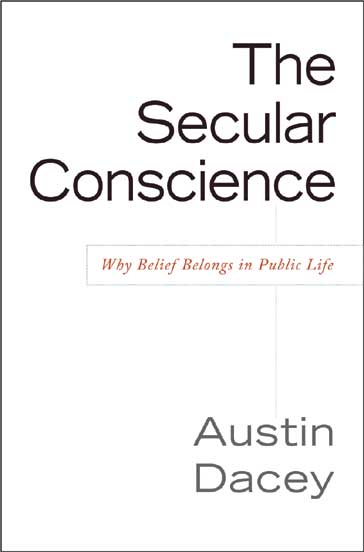 Why, when the Vatican adopts policies liable to increase preventable deaths from AIDS, or a provocative film-maker is murdered on the streets of Amsterdam, do secular liberals remain silent? Why do they denounce as “inexcusable sneering” or “Islam-bashing” the interventions of those few of their fellows prepared to speak out? Because, argues Austin Dacey, they have fallen for the Liberty Fallacy.
Why, when the Vatican adopts policies liable to increase preventable deaths from AIDS, or a provocative film-maker is murdered on the streets of Amsterdam, do secular liberals remain silent? Why do they denounce as “inexcusable sneering” or “Islam-bashing” the interventions of those few of their fellows prepared to speak out? Because, argues Austin Dacey, they have fallen for the Liberty Fallacy.
According to this fallacy, “because conscience [should be] free from coercion, it must be free from criticism”: questions of conscience are private, subjective and hence immune from public scrutiny.
In this rather confident and optimistic treatise Dacey exhorts us to lift the gagging order we’ve imposed on ourselves while in thrall to this dangerous mutation of the (itself authentically liberal) commitment to freedom of belief. He invites us, instead, to enter the “argumentarium”, the forum for open, critical and reasoned conversation refereed by our eponymous hero, the secular conscience.
Our current model for matters of conscience, Dacey suggests, is a variant of the system of private property: we speak of our religious or moral beliefs as “choices” to which we are “entitled” and for which we can’t appropriately be criticised. Scientific practice provides Dacey’s own preferred model. While conscience must indeed be free from state coercion, it remains subject to a “public, collaborative, and critical enterprise that builds up a storehouse of shareable answers to challenges faced by a community” – in Dacey’s argumentarium, the fruitful procedures of the Linux operating system are to be transplanted to the ethical realm.
According to Dacey, it is the open, not the private, conscience which is the true heir to the work of liberalism’s greatest forebears. Spinoza and J.S. Mill, he quips, were keen to spark, not stop, conversations. (Dacey is an adept at the amusing turn of phrase – on faith supported by a “gut feeling”: “consulting entrails has never been a reliable guide to truth, even when those entrails are your own.” On a papal encyclical bemoaning secularisation: “Benedict is right. Secular values can turn a society inside out. In Post-Christian Europe, entire nations have been plunged into endemic health, skyrocketing education, and hopelessly low rates of violent crime.”)
The open, secular conscience he advocates is not, Dacey insists, the exclusive preserve of the unbeliever – it is exercised by all those prepared to offer reasons for their actions and commitments. Dacey makes intriguing use of the story of Abraham and Isaac to argue that any act of faith depends on a prior act of conscience, not vice versa: “conscience cannot be found in duty to God, for it is conscience that must judge where one’s duty lies.” Abraham decides to obey God, judging it to be what he has most reason to do. Believers have reasons for belief – reasons which can be scrutinised by the community of secular conscience.
Dacey is at his least convincing when making the case for a shared set of standards, common to believers and atheists alike. Unhappily, this must surely form the crux of his argument: if we can’t agree on what constitutes a valid reason for an ethical position, then it seems as if our conversations are doomed to remain at cross-purposes. Dacey is more hopeful, but his thesis looks troublesomely dependent on assertions to the effect that “you were born an ethicist”, that “moral facts are ... everyday, honest-to-goodness, natural facts”, or that “operating over human history, conscience leads to the discovery of reliable practices of ethical conduct.” Would that this last were true!
There will then, we must hope, be more profound, more compellingly argued contributions to the great conversation in the argumentarium – but with The Secular Conscience Austin Dacey has, at least, offered us a very engaging ice-breaker.
The Secular Conscience is published by Prometheus

